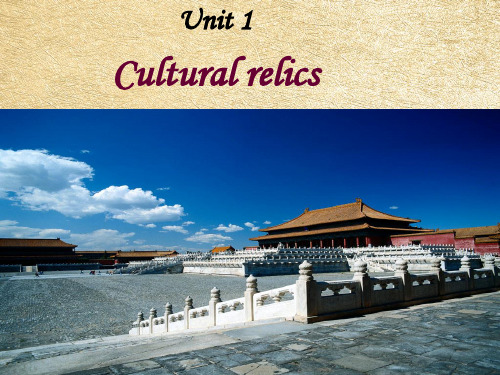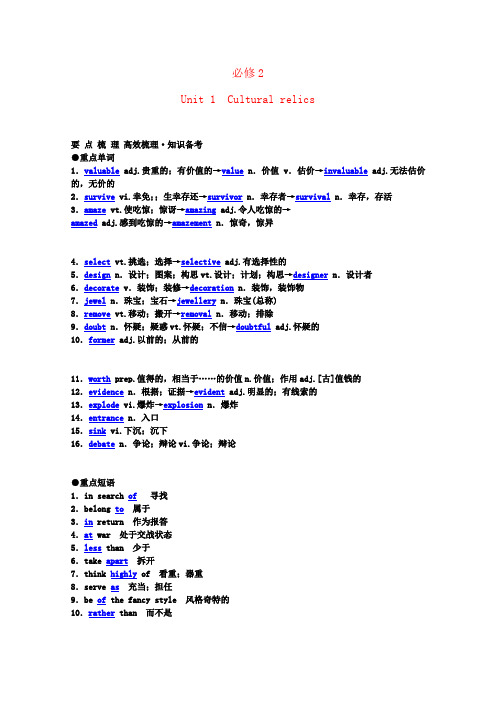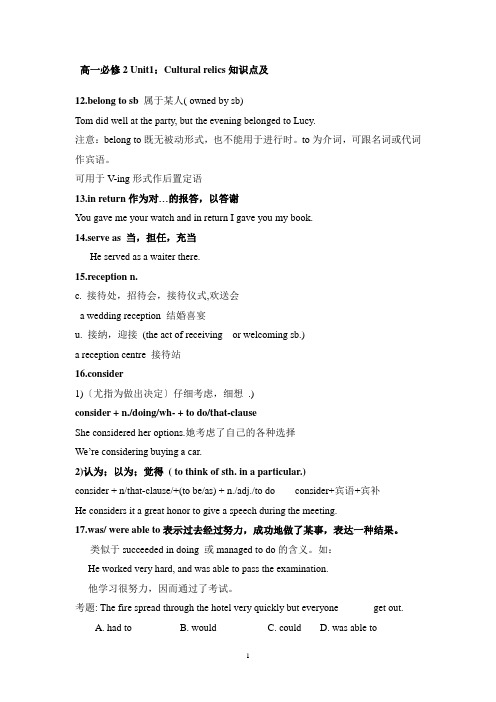Cultural Relics (Warming up)以及知识点分析
人教版高中英语必修二Unit 1 Cultural relics的重要知识点

人教版高中英语必修二Unit 1 Cultural relics的重要知识点1. 词汇与短语:- look into:调查- consider:认为,考虑- in return:作为报答- take apart:拆开- make into:制成- remove:移走- belong to:属于(无进行时和被动语态)- rather than:而不是- remain:保持不变- be popular among/with:在……中流行- survive:幸存下来,后面可以直接加表示“灾难”的名词,如war, flood, fire, accident, earthquake, shipwreck等。
翻译时,可以先将survive后的名词译成“经过……后”,然后再译“幸存下来”。
2. 语法与句型:-注意理解并掌握属于(belong to)这个短语的无进行时和被动语态的特点。
-学习如何在句子中正确使用survive这个单词,并理解其与其他表示“幸存”的单词或短语的区别。
3. 话题与语境:-本单元主题为“文化遗迹”,涉及到文化遗迹的定义、重要性、保护方法等相关话题。
在学习过程中,可以通过阅读相关的文章、观看纪录片等方式,加深对文化遗迹的理解。
-学习如何在不同的语境中运用所学的词汇和短语,如讨论文化遗迹的保护、描述文化遗迹的特点等。
4. 写作技巧:-学习如何撰写关于文化遗迹的文章,包括介绍文化遗迹的历史背景、文化价值、保护现状等。
-掌握在文章中正确运用所学的词汇和短语,使文章表达清晰、准确。
5. 听力与口语:-通过听力材料了解不同地区的文化遗迹及其背后的故事。
-练习用英语讨论文化遗迹相关的话题,提高口语表达能力。
通过掌握以上知识点,学生可以更好地理解和运用英语来讨论文化遗迹这一话题,提高英语综合运用能力。
英语知识点[必修 2]Unit 1《Cultural relics》教案5(1)-总结
![英语知识点[必修 2]Unit 1《Cultural relics》教案5(1)-总结](https://img.taocdn.com/s3/m/0f450836e2bd960590c677c1.png)
高一英语Unit1 Cultural RelicsThe first period (Warming up and Pre-reading)Teaching goals:1.Target languageCultural, survive, remain, state, rare, dynasty, vase, belong to2. Learning ability goalsHelp the students learn how to talk about cultural relics and have the sense of protecting cultural relics.Teaching important pointsTalk about cultural relics and what should be done with them.Teaching difficult points:How to talk about cultural relics.Teaching methods:Group discussion and presentation.(cooperative learning)Teaching procedures:Step1 Warming-upT talks about some famous world heritages to the students. Raise the Ss’awareness that there are some well-known cultural relics both at home and abroad. Ask the Ss to try their best to think of the cultural relics that they know.T: Boys and girls, look at the title of this unit, tell me what the topic of this unit is.Ss: The topic of this unit is cultural relics.T: Do you know what cultural relics are?(Ss can find the answer from the Warming up.)T: OK, very good. Now let me tell you some details about cultural relics. Cultural relics are traces of features surviving from a past age and serving to remind peopleof them. They represent the culture of a place and some periods of history. Can you give me some examples of the cultural relics?S1: The Great Wall.S2: The Pyramids in Egypt.S3: The Imperial Palace. ……T: Well done. (T can give more examples) Unfortunately, some of them are in danger because they are destroyed, and some of them were lost because someone stole them. Now imagine that you work for the state office of cultural relics. You are sent to a small town where you find a relic that was stolen from a palace. It is a rare Ming Dynasty vase. The man who has it insists that it belongs to his family. What will you say to him? Work in pairs to discuss this question, and then I’ll ask some Ss to tell me your answers.3 minutes later, ask some Ss to give their answers.Step 2 Pre-readingT: OK, class, do you think these cultural relics are beautiful?Ss: Yes, very beautiful.T: Suppose one of them got lost, how would you feel and what will you do with it?S1: Try our best to find it.S2: Protect the others in order that they will not lost. ……T: Thanks for your good suggestions. If you find a cultural relic, what will you do with it? You can make a dialogue with your partner on this question.T can practice it with a student to give an example.Sample dialogueT: If you found a cultural relic, what would you do with it?S1: I don't know.T: Would you want to keep it?S1: Of course not.It doesn't belong to me.T: Then why don't you go to your community council?S1: I'm not sure I could trust the people there.What if the person I give it to keeps it for himself?T: Good question.What do the rest of you think?S2: I guess I would ask my parents what to do with it.T: That's a good idea.Anyone else have an idea?S3: I would ask my brother.He is a policeman.Ask some Ss to act their dialogue out.Step 3 Homework1.Preview the reading passage and do exercise I in the part “Learning aboutlanguage”.2.Ask the Ss to look for more cultural relics. The students can go to the library oruse the Internet to search for information.Record after teaching:______________________________________________________________________________________ ______________________________________________________________________________________ ______________________________________________________________________________________ ______________________________________________________________________________________ ______________________________________________________________________________________ ______________________________________________________________________________________ ______________________________________________________________________________________ ___________________The Second Period(Reading and comprehending)Knowledge:Learn some new phrases and some new sentence patterns.Ability:1.Learn some detailed information about the Amber Room.2.Improve the students’ reading ability.3.Train the students’ ability to grasp key information while listening.4.Train the students’ speaking ability.Emotion:1.Train the students’ ability to cooperate with others.2.Enable the Ss to talk about the story of the Amber RoomTeaching important points:1 .The new words and expressions;2. Learn some detailed information about the Amber Room;3. Train the students’ ability to cooperate with others;4. Train the students’ speaking ability.Teaching difficult points:1.Words: ton, stone, heat, design, fancy, style, jewel, king, reception, light,mirror, wonder;2. Phrases: look into, belong to, in search of, in return, at war, take apart, think highly of;3. Sentence patterns:(1) There is no doubt that…..(2) This gift was the Amber Room, which was given this name because almost seven thousand tons of amber were used to make it.4. Improve the students’ reading ability.5.Train the students’ ability to grasp key information while listening.Teaching methods:1.Listening to the tape.2.Learning and practicing.Teaching procedures:Step 1 Greetings and lead-inT: We learned some cultural relics yesterday. Do you still remember them? Give me some examples, please.Students give their answers.T: Very good. Today we’re going to learn another cultural relic. Look at the two pictures on pages1—2; do you know what it is called?Ss: The Amber Room.T: Yes, It’s called the Amber Room.Step2 Fast reading:T: Do you want to know more about the Amber Room? Read the passage first and try to answer the questions:1、Why it is called the Amber Room?2、What else were used to make the room besides amber?3、Why was the Amber Room first built?4、When and why did Frederick William I give the Amber Room to Peter the Great?5、What did Catherine II do with the Amber Room?6、When and how was the Amber Room supposed to have been lost?Five minutes later, ask some Ss to give their answers.Answers:1、It was given the name because almost seven thousand tons of ambers were used to make it.2、The Amber Room was also made with gold and jewels.3、It was made for the palace of Frederick I.4、1716,Frederick William I gave it to Peter the Great, as a gift of friendship.5、Catherine II had the Amber Room moved to the palace outside St Petersburg where she spent her summers6、In 1941, those two countries were at war. German army stole it.Step3 ComprehendingAfter finishing all the questions, ask the Ss to listen to the tape and try to get the main idea of the passage, then read the passage again by themselves and do the comprehending exercises.T: Now read the passage again and finish the exercises of comprehending.The Ss begin to do the exercises. After a while, Teacher begin to collect the answers. Later, teacher gives the answers.Step 4 Post-reading1.Read the passage again to get important information about the text In Search o fthe Amber Room. Then fill in the blanks. (Page73 Best English )Step 4 Speaking or Reading aloudPlay the tape for the students to listen and follow in order to let them know how to read the text.Step 5 Homework1.Read the text several times.2.Do exercise 3 on Page 4.3.Do exercise 1 on Page 42 (Ss’ Book)Record after teaching:_____________________________________________________________________________________________________________________________________________________________________________________________________________________________________________________________________________________________________________________________________________________________________________________________________________________________________________________________________________________________________________________________________________________________________________________________________________________________________________The Third Period(Text analyses and language points)Knowledge:1.Words: ton, stone, heat, design, fancy, style, jewel, king, reception, light, mirror, wonder;Phrases: look into, belong to, in search of, in return, at war, take apart, thinkhighly of;2. Sentence patterns:(1)In 1770, the room was completed the way (that) she wanted it(2) There is no doubt that the boxes were then put on a train for Kingsburg, atthat times a German city on the Baltic Sea.Ability:1.Learn the usage of some difficult words and expressions.2.Train the students’ ability to remove the difficulties while reading.Emotion:1.Train the students’ ability to cooperate with others.2. Know what happened to the Amber Room3.Know the importance of protecting the cultural relics by learning the story ofamber roomTeaching important points:1.Train the students’ ability to read different English names.2.Train the students’ ability to cooperate with others.Teaching difficulties:1.The explanation of some difficult words and expressions.2.Train the students’ ability to remove the difficulties while reading.Teaching procedures:Step 1 RevisionT: In the last period, we learned something about the Amber Room and we also know that this room has a strange history, could you tell me what happened to this room chronologically?The Ss talk it about by themselves for some minutes, and then T gives the answer:Built in Prussia-- Frederick William I--- Sent it to Peter the Great (Russian)-- winter palace Czar--- Catherine II Move outside St Petersburg-- The war between(R&G) Nazi German Secretly stole--Sent to Konigsberg (G)—mystery--- Now RebuiltStep 2 Learning about the language points1.Although it feels as hard as stone, it easily melts when(it is)heated.Feel here means: to give or produce the stated sensation(给人以某种感觉)2.The design for the room was of the fancy style popularin those days. (在句中做表语)(定语后置) 3.There is no doubt that the boxes were then put on a train for konigsberg,at that time a German city on the Baltic Sea.(同位语从句)Step 3 HomeworkIn order to master the usage of these words and expressions, please do some related exercises.1.Translate the sentences on Page 43 into English. Write the English sentences inone of your exercise book and hand it in tomorrow.2.Finish the Reading Task on Page 44.Record after teaching:______________________________________________________________________________________ ______________________________________________________________________________________ ______________________________________________________________________________________ ______________________________________________________________________________________ ______________________________________________________________________________________ ______________________________________________________________________________________ ______________________________________________________________________________________ ___________________The Fourth Period(Learning about Language)Knowledge:1.Learn some new words of this unit.2.Do some exercises of this unit.Ability:1.Learn to write out the words according to their explanation in English.2.Improve the students’ ability of translating.Emotion:Train the students’ ability to cooperate with each other.Teaching important points:1.Learn the new words.2.Train the students’ translating skills.Teaching difficulties:1. Learn to choose the correct words according to the meanings.2. How to improve the students’ translating skills.Teaching procedures:Step 1 Revision.Check the homework exercises.Have a dictation of some words and expressions of reading part.Step 2 Learning about Language.1. Ask the Ss to find the word that means each of the following (Discovering useful words and expressions.) from the reading passage.The Ss begin to do this exercise. After a while, teacher begins to collect their answers and give the correct answers.2.T: Look at the dictionary entry for the phrasal verb “belong to”, and match the meanings with the sentences in the right box.belong to phr v (T)a.to be the property of: That coat belongs to me.b.to be a part of; be connected with: That top belongs to this box.c.to be a member of: He belongs to a large family.Warning:“Belong” is not used in the continuous tense or the passive voice.Eg. The computer is belonging to my sister. (F)The computer is belonged to my sister (F)The computer belongs to my sister. (T)The Ss begin to do this exercise. After a while, teacher begins to collect the answers. Later, teacher gives the right answers.3.T: let’s look at exercise 3.The preposition sometimes indicates a state,condition or a continuous activity. Look at the sentence of exercise 3 and try to express each of them in another way.After several minutes, T gives the answers.Step 3 Translation (P43 SB)Do this translating exercise with the Ss together. Tell the Ss how to do this kind of exercise.Step 4 Homework1.Finish Ex1 on P4: find out the sentences with attributive clause.2.After class, read the passage on Page 5.Record after teaching;__________________________________________________________________________________________________________________________________________________________________________________________________________________________________________________________________ ______________________________________________________________________________________ ______________________________________________________________________________________ ______________________________________________________________________________________ ______________________________________________________________________________________ ___________________.。
unit1-cultural-relics-Warming-up

Louvre Museum(卢浮宫)
卢浮宫始建于13世纪, 是当时法国路易王室的城堡, 被充当为国库及艺术馆 。
London Tower (伦敦塔)
Taj Mahal(泰姬陵)
It is located in India.
It is the grave that a king built for his wife.
Have you ever seen a piece of amber? What do you know about it?
Amber
Have you ever seen anything made of amber?
What is aRmabwearW?mhbaetriswtihthisi?nclusions
Unit 1
Cultural relics
Do you know what these things are?
Cultural
Relics
Do you know what festival is the second Saturday of June?
Culture Heritage Day 文化遗产日
Kunqu opera
Since Yuan Dynasty-Nonmaterial relic
What is a cultural relic?
A cultural relic is something that has survived for a long time, often a part of something old that has remained when the rest has been destroyed; it tells people about the past.
高一必修三英语u2知识点

高一必修三英语u2知识点【介绍】高一必修三英语Unit 2讲述了“Cultural relics”(文化遗产)这一主题,主要涉及到文化遗产的定义、保护和修复等方面的知识。
以下是该单元的重点内容。
【文化遗产的定义】文化遗产是指反映民族、国家历史和文化发展的不可移动和可移动的实物,包括古迹、古物、古书等。
文化遗产承载着人类的文明与智慧,对于历史的研究和文化的传承具有重要意义。
【文化遗产的保护】文化遗产的保护是指对文化遗产资源进行合理的管理、保护和利用,使其得以保存和传承。
保护文化遗产需要社会各界的共同努力与意识,保护的方式包括法律保护、物质保护和传统保护等。
1. 法律保护:各国都有相应的法律来保护文化遗产,对于特定的文化遗产,如世界遗产,会制定更为严格的保护措施。
2. 物质保护:对于文化遗产的物质形态,如古建筑、文物等,需要进行定期的维护保养,以确保其保存完好。
3. 传统保护:文化遗产的保护不仅仅是物质层面的保护,在传承和利用过程中,传统工艺、技艺的传承也起到重要的作用。
【文化遗产修复与争议】文化遗产修复是指对受损文化遗产进行修复和复原的过程。
然而,文化遗产修复也引起了一系列的争议。
1. 现代性与传统性的冲突:在修复文化遗产时,如何平衡现代性与传统性之间的冲突是一个重要的问题。
一方面,修复需根据传统技艺进行,但另一方面,现代技术可能更有效地保护和修复文化遗产。
2. 修复与原真性的关系:修复文物时,保持其原真性是一个值得思考的问题。
有些人主张保留古物的痕迹和历史痕迹,而另一些人则认为应将其修复到原始状态。
3. 资金与资源投入:文化遗产修复需要大量的资金与资源投入,这对于一些贫困地区的保护和修复是一个巨大的挑战。
【文化遗产的重要性】保护和传承文化遗产对于人类社会具有重要意义。
1. 文化传承:文化遗产承载着人类的历史和文化,对于文化的传承具有重要意义。
它们是国家和民族的骄傲、记忆和认同。
2. 促进旅游业发展:许多文化遗产地成为了旅游景点,吸引着游客的到来,促进了当地的经济和旅游业的发展。
高中英语必修二Unit1 Cultural relics Warming up课件

• • • • •
Words and expressions of cultural cultural adj. 文化的 a cultural independence / cultural exchange relic n. sth. old that reminds us of the past 遗迹;古物 unearthed cultural / a relic of early civilization rare adj. 稀罕的;稀有的;珍贵的
• To our _________,the boy should have completed such an _______ performance, at which we were so ______ amazement that we all watched in ________.
amazing amazed amazement
• Select sb to do 选择某人做某事 • Select…as…挑选…作为 • Select …from… 从…中挑选
• He was selected to design a new logo for the company.
• The players ______(select) from the whole country are expected to bring us honor in this summer game. • Select 精挑细选 标准严格 • Elect 选举 推选 正式手续
SOME NEW WORDS
• rare---(adv)rarely valuable---(n) value former—previous informal---formal • design—designer worth---be worth doing local---local people, local government
人教版高中英语必修2高考Unit 1 Cultural relics要点梳理+重点突破 新

必修2Unit 1 Cultural relics要点梳理高效梳理·知识备考●重点单词1.valuable adj.贵重的;有价值的→value n.价值 v.估价→invaluable adj.无法估价的,无价的2.survive vi.幸免;;生幸存还→survivor n.幸存者→survival n.幸存,存活3.amaze vt.使吃惊;惊讶→amazing adj.令人吃惊的→amazed adj.感到吃惊的→amazement n.惊奇,惊异4.select vt.挑选;选择→selective adj.有选择性的5.design n.设计;图案;构思vt.设计;计划;构思→designer n.设计者6.decorate v.装饰;装修→decoration n.装饰,装饰物7.jewel n.珠宝;宝石→jewellery n.珠宝(总称)8.remove vt.移动;搬开→removal n.移动;排除9.doubt n.怀疑;疑惑vt.怀疑;不信→doubtful adj.怀疑的10.former adj.以前的;从前的11.worth prep.值得的,相当于……的价值n.价值;作用adj.[古]值钱的12.evidence n.根据;证据→evident adj.明显的;有线索的13.explode vi.爆炸→explosion n.爆炸14.entrance n.入口15.sink vi.下沉;沉下16.debate n.争论;辩论vi.争论;辩论●重点短语1.in search of寻找2.belong to属于3.in return 作为报答4.at war 处于交战状态5.less than 少于6.take apart拆开7.think highly of 看重;器重8.serve as充当;担任9.be of the fancy style 风格奇特的10.rather than 而不是●重点句型1.Frederick William I, the King of Prussia, could never have imagined that his greatest gift to the Russian people would have such an amazing history.普鲁士国王腓特烈·威廉一世永远想象不到,他赠给俄罗斯人民的最厚重的礼物会有这样一段令人惊讶的历史。
2019年高中英语Unit1CulturalrelicsSectionⅡWarmingUp

风格;风度;类型 移动;搬开 以前的;从前的 值得的;相当于……的价值 价值;作用 [古]值钱的
Ⅱ.拓展词汇 1. cultural adj.文化的→culture n.文化;文明 2. rare adj.稀罕的;稀有的;珍贵的→rarely adv.稀少地;罕
见地 3. valuable adj.贵重的;有价值的→value n.价值 vt.估价;重
2.(教材 P1) IN SEARCH OF THE AMBER ROOM 寻找琥珀屋
in search of 寻找;搜寻
in one's/the search for search sb./sp. search ... for ... search for=look for make a search for sb./sth.
Section Ⅱ Warming Up & Reading — Language Points
一、这样记单词
记得准·写得对
Ⅰ.基础词汇 1. dynasty n. 2. fancy adj.
vt.
朝代;王朝 奇特的;异样的 想象;设想;爱好
3. style n. 4. remove vt. 5. former adj. 6. worth prep.
[语境串记] Tom hurried into the room as if in search of something important. He searched the drawer for John's telephone number. And then he began to search for his address again. 汤姆匆匆进入房间,好像在寻找重要的东西。他搜寻抽 屉找约翰的电话号码,然后他又开始寻找他的地址。
人教版英语必修2-Unit1-cultural-relics-知识点详解

高一必修2 Unit1:Cultural relics知识点及12.belong to sb 属于某人( owned by sb)Tom did well at the party, but the evening belonged to Lucy.注意:belong to既无被动形式,也不能用于进行时。
to为介词,可跟名词或代词作宾语。
可用于V-ing形式作后置定语13.in return作为对…的报答,以答谢You gave me your watch and in return I gave you my book.14.serve as 当,担任,充当He served as a waiter there.15.reception n.c. 接待处,招待会,接待仪式,欢送会a wedding reception 结婚喜宴u. 接纳,迎接(the act of receiving or welcoming sb.)a reception centre 接待站16.consider1)〔尤指为做出决定〕仔细考虑,细想.)consider + n./doing/wh- + to do/that-clauseShe considered her options.她考虑了自己的各种选择We’re considering buying a car.2)认为;以为;觉得( to think of sth. in a particular.)consider + n/that-clause/+(to be/as) + n./adj./to do consider+宾语+宾补He considers it a great honor to give a speech during the meeting.17.was/ were able to 表示过去经过努力,成功地做了某事,表达一种结果。
类似于succeeded in doing 或managed to do的含义。
- 1、下载文档前请自行甄别文档内容的完整性,平台不提供额外的编辑、内容补充、找答案等附加服务。
- 2、"仅部分预览"的文档,不可在线预览部分如存在完整性等问题,可反馈申请退款(可完整预览的文档不适用该条件!)。
- 3、如文档侵犯您的权益,请联系客服反馈,我们会尽快为您处理(人工客服工作时间:9:00-18:30)。
The old woman survived her own daughter by ten years. 这个老妇人在她女儿死后又活了10年 The whole family survive on the father’s tiny salary(工资) 全家人靠着父亲微薄的工资艰难度日。
(幸存)for a long time to tell people about the past and record(记载) the history, and it is very
rare and valuable. Cultural relics can be buildings, craftworks(手工艺品), paintings, traditional customs(传统习俗) and so on.
It is a remains, which reminds us of the 屈辱 史
Stonehenge(巨石阵)
Religion(宗教), astronomy (天文,天象)
Ming Dynasty Vase 明代花瓶
The Terracotta Warriors and Horses 秦始皇陵兵
3. It was a castle for the king of France.
The Statue of Liberty 自由女神像
1. It is the symbol of the USA. 2. The Goddess(女 神) holds a torch(火 炬) in her right hands.
Is it worth(值得) rebuilding lost cultural relics such as Yuanmingyuan? Give your reasons.
think about the following things:
1. The cost and its value(花费和意义) 2. Whether it can be faithfully(如实 地)
Unit 1
Cultural relics
Chinese cultural relics(文物,文化遗产)
The Great Wall 长城
The symbol(象征) of China
The forbidden city(紫禁城,故
宫)
It is a museum
Yuan Ming Yuan 圆明圆
暴风雨).
3. This custom _s_t_il_l_s_u_r_v_i_v_e_s_______( 还保存着).
4. She lived five years longer than her husband.
= She _s_u_r_v_i_v_e_d__ her husband _b_y__ five years.
Language points
1. Survive vi. 幸存,幸免,生还
eg. In the car accident, only one child survived.
这场车祸中仅有一个小孩活了下来。
These cultural relics have survived from ancient times.这些文物是从古代留下来的。 Vt.艰难度过……,经历……之后继续存在, eg.Two-thirds of the people survived the earthquake.经历这次地震,三分之二的人活了下 来。
马俑
清明上河图 paintings
Folk culture(民俗文化)
What are cultural relics?
A cultural relic is something that represents (代表)a certain kind of culture. It has survived
reproduced(重建).
3. Whether it helps peopsuch a building was
destroyed. (是否有教育意义?)
Useful expressions: I think it is worthwhile to do so, because… In my opinion, it is not worthwhile , for… To my understanding,… As far as I am concerned,…
3. It showed the deep love of the king and queen.
Louvre Museum卢浮宫
1. It is a very big, old and wellknown museum in Paris, France.
2. It was built in the 13th century.
The Pyramids in Egypt
埃及金字塔
The tombs(墓) for Pharaoh (法老)in ancient Egypt (cultural and natural relics).
Taj Mahal泰姬陵
1. It lies in(位于) India.
2. It is the grave(坟 墓) a king built for his wife.
Survive sth在……之后仍然活着 Survive sb by…比某人活得长 survive on 靠(很少的钱)继续维持生活
1.He _s_u_r_v_i_v_e_d__(i_n__)_t_h_e__p_l_a_n_e_c_r_a__sh___(在这次
坠机事故中幸存下来).
2. The house _s_u_r_v_i_v_e_d__t_h_e__s_t_o_r_m___(经受住了
